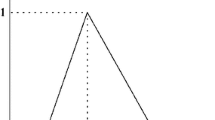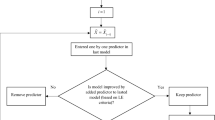Abstract
This study is an investigation of fuzzy logistic regression model for crisp input and fuzzy output data. The response variable is non-precise and is measured by linguistic terms. Especially this research develops least absolute deviations (LAD) method for modeling and compares the results with the least squares estimation (LSE) method. For these, two estimation methods, min–max method and fitting method, are provided in this research. This study presents new goodness-of-fit indices which are called measure of performance based on fuzzy distance \((M_p)\) and index of sensitivity \((I_S)\). The study gives two numerical examples in real clinical studies about systematic lupus erythematosus and the other one in the field of nutrition to explain the proposed methods. In addition, we investigate the sensitivity of two estimation methods in the case of outliers by a numerical example.

Similar content being viewed by others
Explore related subjects
Discover the latest articles, news and stories from top researchers in related subjects.References
Agresti A (2002) Categorical data analysis. Wiley, New York
Celmins A (1987) Least squares model fitting to fuzzy vector data. Fuzzy Sets Syst 22:245–269
Chachi J, Taheri SM (2013) A least-absolutes regression model for imprecise response based on the generalized Hausdorff-metric. J Uncertain Syst 7:265–276
Chang PT, Lee CH (1994) Fuzzy least absolute deviations regression based on the ranking of fuzzy numbers. In: Proceedings of IEEE world congress on computational intelligence, pp 1365–1369
Choi SH, Buckley J (2008) Fuzzy regression using least absolute deviation estimators. Soft Comput 12:254–263
Choi SH, Kim HK, Park KO (2000) Nonlinear regression quantiles estimation. J Korean Stat Soc 29:187–199
Dielman TE (1986) A comparison of forecasts form least absolute value and least squares regression. J Forecast 5:189–195
Diamond P (1987) Least squares fitting of several fuzzy variables. In: Proceedings of the second IFSA congress, Tokyo, pp 20–25
Dubois D, Prade H (1988) Possibility theory. Plenum Press, New York
Fauci AS, Braunwald E, Kasper DL, Hauser SL, Longo DL, Jameson JL, Loscalzo J (2008) Harrison’s principals of internal medicine. Wiley, New York
Hatamizadeh N, Eftekhar H, Shafaghi B, Mohammad K (2007) Effects of folic acid on preschool childrens appetite: randomized triple-blind clinical trial. Pediatr Int 49:558–563
Hong DH, Lee S, Do DY (2001a) Fuzzy linear regression analysis for fuzzy input-output data using shape preserving operations. Fuzzy Sets Syst 122:513–526
Kelkinnama M, Taheri SM (2012) Fuzzy least-absolutes regression using shape preserving operations. Inf Sci 214:105–120
Kim B, Bishu RR (1998) Evaluation of fuzzy linear regression models by comparing membership functions. Fuzzy Sets Syst 100:343–352
Klir GJ (1987) Where do we stand on measures of uncertainty, ambiguity, fuzziness, and the like? Fuzzy Sets Syst 24:141–160
Neter J, Wasserman W, Kutner MH, Nachtsheim C (1996) Applied linear statistical models. McGraw-Hill, Boston
Pourahmad S, Ayatollahi SMT, Taheri SM (2011a) Fuzzy logistic regression, a new posssibilistic regression and its application in clinical vague status. Iran J Fuzzy Syst 8:1–17
Pourahmad S, Ayatollahi SMT, Taheri SM, Agahi ZH (2011b) Fuzzy logistic regression based on the least squares approachs with application in clinical studies. Comput Math Appl 62:3353–3365
Ramli AA, Watada J, Pedrycz W (2011) Possibilistic regression analysis of influential factors for occupational health and safety management systems. Saf Sci 49:1110–1117
Taheri SM, Kelkinnama M (2012) Fuzzy linear regression based on least absolute deviations. Iran J Fuzzy Syst 9:121–140
Taheri SM, Mirzaei Yeganeh M (2009) Logistic regression with non- precise data. In: Proceedings of the 57th ISI (International Statistical Institute) Congress, South Africa, Durban, pp 1–9
Tanaka H, Uejima S, Asai K (1982) Linear regression analysis with fuzzy model. IEEE Trans Syst Man Cyb 12:903–907
Torabi H, Behboodian J (2007) Fuzzy least-absolute estimates in linear models. Commun Stat Theory Methods 36:1935–1944
Tseng FM, Lin L (2005) A quadratic interval logit model for forecasting bankruptcy. Omega 33:85–91
Wolfram Research Inc (2007) Mathematica, Version 6.0, Champaign, IL
Zimmerman HJ (2001) Fuzzy set theory and its applications. Kluwer Nihoff, Boston
Acknowledgments
The child’s appetite data which was used in the second numerical example of this paper was a part of a project which was funded by National Nutrition and Food Technology Research Institute of Shahid Beheshti University of Medical Sciences. The authors acknowledge their gratitude to Dr. M. Rezaei, Dr. N. Kalantari and Dr. N. Omidvar for that project. The authors acknowledge the anonymous reviewers for their valuable comments and suggestions to improve the article.
Author information
Authors and Affiliations
Corresponding author
Additional information
Communicated by J.-W. Jung.
Rights and permissions
About this article
Cite this article
Namdari, M., Yoon, J.H., Abadi, A. et al. Fuzzy logistic regression with least absolute deviations estimators. Soft Comput 19, 909–917 (2015). https://doi.org/10.1007/s00500-014-1418-2
Published:
Issue Date:
DOI: https://doi.org/10.1007/s00500-014-1418-2




